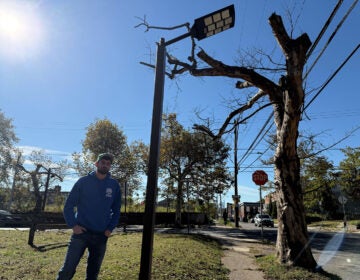EPA to clean up former Sherwin-Williams site in South Jersey where water and soil were contaminated
The paint manufacturer contaminated local waterways, groundwater and soil in Camden County with arsenic, lead and other metals.
Listen 0:58
File - The smokestacks of the former Lucas paint factory loom over the Sherwin-Williams/Hilliards Creek Superfund site in Gibbsboro, New Jersey, in 2017. (Emma Lee/WHYY)
This story is part of the WHYY News Climate Desk, bringing you news and solutions for our changing region.
From the Poconos to the Jersey Shore to the mouth of the Delaware Bay, what do you want to know about climate change? What would you like us to cover? Get in touch.
Federal environmental regulators have announced a plan to clean up toxic chemicals at a former Sherwin-Williams site in Gibbsboro, New Jersey.
For decades, the paint manufacturer dumped burnt paints and solvents, which contaminated local waterways, groundwater and soil — including on residential properties — with arsenic, lead and other metals.
The U.S. Environmental Protection Agency added the property to the federal National Priorities List in 2008, making it eligible for funding and cleanup under the Superfund program. The site includes three Camden County locations in Gibbsboro and Voorhees, where Sherwin-Williams manufactured, dumped and burned paint and related compounds.
The agency’s latest remediation proposal includes injecting organic materials and nutrients into the ground to spur the growth of naturally occurring bacteria to break down toxic chemicals.
“We are already addressing much of the source of the contamination in this groundwater and this plan moves us one step closer to a full cleanup,” said EPA Regional Administrator Mike Martucci in a statement. “Cleaning up sites like this provides great health and economic benefits to communities and Superfund cleanups are at the core of EPA’s work to provide clean air, land and water for everyone.”
The EPA has already begun removing contaminated soil and recovering liquid chemicals trapped underground, which is expected to help prevent contaminants from reaching groundwater. The agency said it will continue to restrict the use of the groundwater and conduct regular water testing.
A class-action lawsuit alleging nearby residents developed cancer and other serious illnesses as a result of the contamination was dismissed by a judge in 2018.

Get daily updates from WHYY News!
WHYY is your source for fact-based, in-depth journalism and information. As a nonprofit organization, we rely on financial support from readers like you. Please give today.






